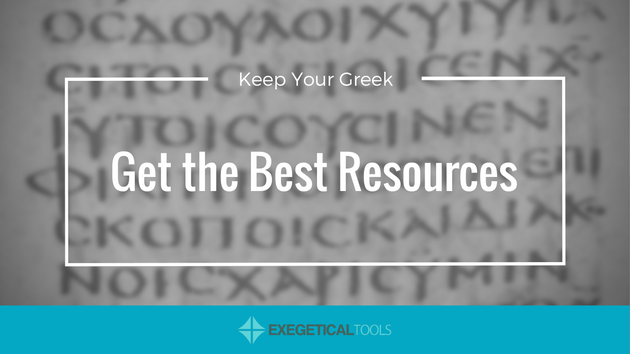
The first step to keeping your Greek is to choose the right Greek Bible. Beyond this, there are many other ways to help keep your Greek, one of the most important being that you get the best resources. There are different types of resources, and it’s great to have a couple in each category within reach at your desk.
Grammars
Everyone learns from one grammar, but it’s important to have at least one more. The latest major grammar is from the late Rodney Decker, Reading Koine Greek, and it’s well done. Its explanations are helpful, his treatment of the Greek verb is on track, and it contains workbook questions and answers to increase your comprehension. There is always Mounce’s popular textbook, and Croy’s is nice as well with its LXX sentences.
Beyond these, you might find older grammars in used book sales. I like to buy these and skim through them quickly for fun and to remain acquainted with basic grammar. Having multiple grammars is useful because each book explains concepts differently, and all of them summarize complex information, so grammars will complement each other by filling in the picture more fully for you.
Readers
Greek readers are a natural next step beyond Greek 2 and even after Greek 3 and 4. They are an organized and structured means of continuing to read lots of Greek, which is the best way to improve your languages. Rodney Decker’s uses texts from the NT, LXX, Apostolic Fathers and the creeds. Karen Jobes’ LXX reader is also useful, since it enables you to sit with your LXX and read large chunks at a time with good morphological and syntactical helps. Herbert Bateman has an intermediate workbook for 1-3 John with various questions and helps for translating the book. Other readers are those by Mounce, Whitacre, Goodrich, and McLean.
Linguistic Helps
More and more books are being published that help with syntax and morphology as well as textual-criticism. These types of works are perfect to have right beside your Greek New Testament. First are the grammar helps. Lee Irons’ syntax guide helps with tough syntax throughout the entire NT. Zerwick’s Grammatical Analysis of the Greek NT provides a philological explanation of all difficult forms. Baylor’s Handbook on the Greek Text series provides concise help with syntax and some discourse structure, while B&H’s Exegetical Guide to the Greek NT series provides more extensive syntax help but no attention to language above the sentence level. Also check out the series Translating Clause by Clause.
Next are the textual-criticism helps. Bruce Metzger’s Textual Commentary provides the rationale for all the text-critical decisions found in the UBS text. Philip Comfort’s Commentary book provides a guide to the NT manuscripts and significant variants, as well as a superb section on the Nomina Sacra.
Technology
Bible software can be a crutch that will actually keep you from retaining and improving your languages, but if you use them right (for frequent reading of the Bible in its original language without using all the parsing helps), they can keep you “in the game.” Apps let you follow sermon texts in Greek and read the NT and LXX on the go, while computer software helps you translate through books quickly with the tools you need to learn what you can’t figure out on your own (complex morphologies, vocabulary, etc.). Some of the best apps are Blue Letter Bible and PocketSword, each with their own strengths. One reader (whom we thank) also added that the SBLGNT Reader app is free, lightweight, and great for sermon prep.
Computer software consists of the big three: BibleWorks, Accordance, and Logos. BibleWorks is sheer exegesis power, with tons of resources included in the purchase price. It gives you the best bang for the buck required, and we’ve reviewed version 10. Accordance is also an exegesis machine, but allows you to buy more resources and more e-books that are not strictly exegetical resources. Your total cost will rise with Accordance. And then if you can suffer to sacrifice your firstborn son, you can buy one of Logos’s packages. You can do lots of exegesis with Logos, but its engine is much heavier and slower and lacks many of the quick and advanced search and statistical functions that BibleWorks and Accordance have.
Some buy Logos and then either BibleWorks or Accordance to complement it. I own BibleWorks and use the Logos engine for free resources that they provide occasionally, and for some free classics packages that I’ve acquired and that have been very useful. One final factor to consider is that Accordance and Logos have mobile apps while BibleWorks does not.
Media
Educators are learning more and more to utilize media, much of it video. Two organizations, independently and nearly simultaneously, broke into the video field with Greek education. Daily Dose of Greek has been producing daily 2-minute videos to help people stay in the language every day. The videos cover translation and some syntax, but two minutes pass quickly.
Here at Exegetical Tools, we wanted to provide the same sort of educational experience you would get in a Greek 3, 4, or elective class. For example, our Colossians, Jude, and Philippians series are a Greek 3 level; our James series is a Greek 4 level; and our Acts series resembles an advanced Greek grammar elective. All our series are produced by Greek professors who have class experience. You can also look forward to forthcoming series by new professors covering Romans, Galatians, Hebrews, Ezekiel, Judges, and more.
Keep your Greek by getting the best resources Share on XRead!
However you encounter the text, just make sure you do consistently. If you have the discipline, just go at it with your Greek Bible, a dictionary, and a grammar. But having the best resources will also set you up for success.
